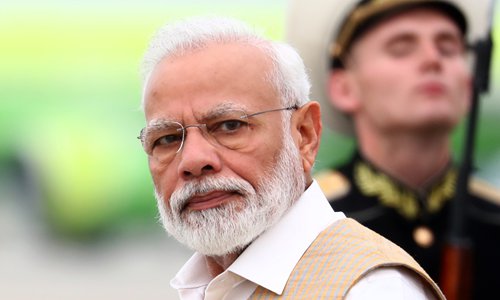HOME >> WORLD
Indian students protest fee hikes
By Chi Jingyi Source:Global Times Published: 2019/11/14 21:33:41
Price increases would force many to quit school

India's Prime Minister Narendra Modi Photo: IC
In an effort to quell protests by thousands of students, India's Jawaharlal Nehru University (JNU) has reduced fee hikes, which in some cases tripled the cost of services, according to a press release from the school on Wednesday.
On Monday the university reported that thousands of students protested outside a convocation ceremony and prevented officials from leaving the venue for many hours.
Thousands of JNU students protested on Tuesday, urging a "roll back of the steep fee hike." Students from Delhi University on Wednesday also held demonstrations in support of JNU students, The Hindu reported.
"The majority of the students come from rural backgrounds, deprived sections, and middle-income families, and depend on scholarships to study at JNU," The Hindu reported citing the JNU student union (JNUSU).
JNU's press release said the school will reduce the planned fee hikes for needy students from low-income families.
The protests began after JNU announced student room rents were to increase from 20 rupees ($0.28) to 600 rupees and security deposits from 5,500 to 12,000 rupees. On Wednesday the university said students from low-income families will pay 300 rupees for a room per month, which was still more than 10 times the original cost, and security deposits for all students had been rolled back to the original 5,500 rupees.
A former member of the JNUSU who attended the protest, told the Global Times that the fee hikes are unaffordable for most students and need to be rolled back. The student asked to remain anonymous.
Dai Yonghong, a professor of the Institute of South Asia Studies at Sichuan University who said he has visited a number of universities in India, doesn't believe the protests are going to last long.
"The wealth gap in India is growing. The poor are still struggle to go to college, and the rich don't realize [the financial difficulty they face]. This was also the cause of the protests," Dai told the Global Times.
"Higher education in India as a whole is lagging behind, and the government is spending very little on education. Many universities have outdated equipment and lack proper infrastructure. They also don't have enough teachers."
"India's economy is growing, but it is not spending more on education; instead, more on defense. Investment in education cultivates talents, who are the driving force for economic growth. You should not put the cart before the horse," an independent Chinese analyst who used to live in India for many years told the Global Times on Tuesday, but asked not to be named fearing retaliation from India.
Posted in: ASIA-PACIFIC